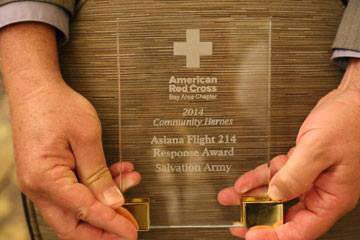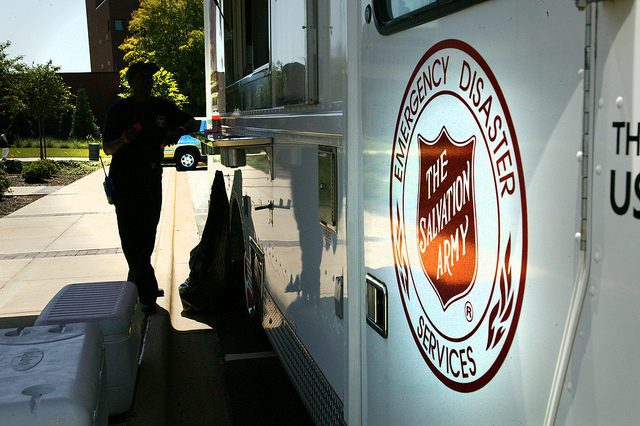Listen to this article
Listen to this article
Loading
Play
Pause
Options
0:00
-:--
1x
Playback Speed- 0.5
- 0.6
- 0.7
- 0.8
- 0.9
- 1
- 1.1
- 1.2
- 1.3
- 1.5
- 2
Audio Language
- English
- French
- German
- Italian
- Spanish
Open text
being a messenger. by rob docter, editor-in-chief –. to the messengers of light. during your welcome meeting, as territorial commander commissioner james knaggs introduced the 52 of you new cadets to the territory, i began to focus on the first word of your session’s name—messengers of light. the speakers focused on the last word, “light,” but i continued to ponder the word “messenger.”. god is light. light has to shine somewhere in order to be noticed. it’s most powerful in the dark. humans activate the light. when it goes “on” it changes the viewer’s perception of the surrounding content as well as their feelings about the environment. light is not always measured by wattage. some humans “light up a room.” they glow. they are magnets who attract other humans to them because they have the light within them and move through life letting it shine. this little light of mine, i’m gonna let it shine. somebody has to bring the light and let it shine. here’s a “doctored” story of what appears to be an actual event from which we can learn a lot about being a messenger. “get me pheidippides,” shouted the commander of the greek troops. the battle of marathon had ended. greek forces had prevailed. the persians suffered their first defeat. a message of the victory alerting athens, next in line on the persian list, provided the large city-state the opportunity to avoid seeking costly allies. “but sir,” said his aide, “pheidippides has just returned from running 240 km (150 miles) to sparta in two days. he is our greatest runner and needs to rest.”. “did you hear me? get me pheidippides.”. “sir, a horseman would be faster.”. the commander paused: “i can tell you are concerned about your friend. horses are faster, but they must slow down and rest after (eight or ten miles). besides, the terrain is very difficult. humans are faster in the long run.”. “i understand, sir”. pheidippides, the top courier for greek forces, reported to the commander, received his instructions and sped off the battlefield. he arrived the next day, was ushered into the presence of the athenian leaders and said: “joy, we win!” immediately, he collapsed and died. in 1878, poet robert browning wrote a poem titled pheidippides. so, when persia was dust, all cried, “to acropolis! run, pheidippides, one race more! the meed (reward) is thy due! athens is saved, thank pan, go shout!” he flung down his shield. ran like fire once more: and the space twixt the fennel-field. and athens was stubble again, a field which a fire runs through,. till in he broke: “rejoice, we conquer!” like wine through clay,. joy in his blood bursting his heart, the bliss! organizers of the modern olympic games became aware of this poem through baron pierre de coubertin, a member of the group and decided to develop a new event for the games—a 26.2 mile race. they called the race a marathon. note: officership is like running a marathon. the messenger did not work half-time. he was ready when the commander called. he didn’t argue about the appointment or look around to delegate the responsibility to somebody else. he was ready to do whatever was required. he gave his all. he selected the word “joy” as his first word on reaching his destination. he completed his task. there’s nothing half-way in running a marathon. you’re either all in or all out. he brought “good news.”. he was in shape, ready to carry the message at a moment’s notice.
Open context player
Close context player
Plays:-Audio plays count
being a messenger. by rob docter, editor-in-chief –. to the messengers of light. during your welcome meeting, as territorial commander commissioner james knaggs introduced the 52 of you new cadets to the territory, i began to focus on the first word of your session’s name—messengers of light. the speakers focused on the last word, “light,” but i continued to ponder the word “messenger.”. god is light. light has to shine somewhere in order to be noticed. it’s most powerful in the dark. humans activate the light. when it goes “on” it changes the viewer’s perception of the surrounding content as well as their feelings about the environment. light is not always measured by wattage. some humans “light up a room.” they glow. they are magnets who attract other humans to them because they have the light within them and move through life letting it shine. this little light of mine, i’m gonna let it shine. somebody has to bring the light and let it shine. here’s a “doctored” story of what appears to be an actual event from which we can learn a lot about being a messenger. “get me pheidippides,” shouted the commander of the greek troops. the battle of marathon had ended. greek forces had prevailed. the persians suffered their first defeat. a message of the victory alerting athens, next in line on the persian list, provided the large city-state the opportunity to avoid seeking costly allies. “but sir,” said his aide, “pheidippides has just returned from running 240 km (150 miles) to sparta in two days. he is our greatest runner and needs to rest.”. “did you hear me? get me pheidippides.”. “sir, a horseman would be faster.”. the commander paused: “i can tell you are concerned about your friend. horses are faster, but they must slow down and rest after (eight or ten miles). besides, the terrain is very difficult. humans are faster in the long run.”. “i understand, sir”. pheidippides, the top courier for greek forces, reported to the commander, received his instructions and sped off the battlefield. he arrived the next day, was ushered into the presence of the athenian leaders and said: “joy, we win!” immediately, he collapsed and died. in 1878, poet robert browning wrote a poem titled pheidippides. so, when persia was dust, all cried, “to acropolis! run, pheidippides, one race more! the meed (reward) is thy due! athens is saved, thank pan, go shout!” he flung down his shield. ran like fire once more: and the space twixt the fennel-field. and athens was stubble again, a field which a fire runs through,. till in he broke: “rejoice, we conquer!” like wine through clay,. joy in his blood bursting his heart, the bliss! organizers of the modern olympic games became aware of this poem through baron pierre de coubertin, a member of the group and decided to develop a new event for the games—a 26.2 mile race. they called the race a marathon. note: officership is like running a marathon. the messenger did not work half-time. he was ready when the commander called. he didn’t argue about the appointment or look around to delegate the responsibility to somebody else. he was ready to do whatever was required. he gave his all. he selected the word “joy” as his first word on reaching his destination. he completed his task. there’s nothing half-way in running a marathon. you’re either all in or all out. he brought “good news.”. he was in shape, ready to carry the message at a moment’s notice.
Listen to this article















